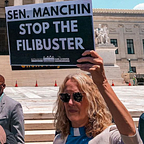The Rise of the Religious Left: Why the old ‘moral majority’ is crumbling
Bernie Sanders and Donald Trump are not the only ones upsetting politics as usual.The religious left, once overshadowed by a better-organized Christian right, is making a surprise comeback. This growing group of interfaith, interracial, and intergenerational clergy is championing progressive causes in Southern states and winning. As religious conservatives remain divided and perplexed by this year’s presidential candidates, progressive faith leaders are surging ahead. As more than 45 million Americans live below the poverty line and nearly 30 million Americans remain uninsured, progressive faith leaders are working to not only save souls but to improve the quality of millions of lives.
No longer do religious leaders like Jerry Falwell Jr. dominate news coverage of religion and politics. Many of the culture war issues have fallen to the back burner, and the moral economy, championed by Pope Francis and a certain secular Jewish Democratic presidential candidate, has taken center stage this election cycle with narratives of fairness and justice, driving the political discourse.
In 2010, a coalition of progressive and pro-life faith groups, in particular Catholic Sisters, helped pass the Affordable Care Act in part by shoring up pro-life Catholic Democrats who were worried about Christian right myths around funding for abortion.
During the 2012 presidential election season, the Nuns on the Bus Campaign rolled through seven states drawing thousands of supporters as they called for moral budgets, opposing Catholic House Speaker Paul Ryan’s draconian budget cuts to social programs that sustain impoverished communities and seniors.
North Carolina’s “Moral Mondays,” driven by Rev. William Barber, has mobilized thousands of supporters with hundreds committing civil disobedience in order to oppose cuts to anti-poverty and education programs and defend voting rights. This year faith leaders were even instrumental in passing state minimum wage ordinances in Washington State.
Justice for immigrants, the other hot topic this election cycle, has been championed by all religious communities. When 20 U.S. governors moved to bar Syrian immigrants in the wake of the Paris bombing, religious leaders from left to right sounded the alarm. Within 24 hours, Faith in Public Life had mobilized hundreds of faith leaders to deliver petitions before news cameras at city halls across the country.
Prominent Southern Baptist leader Russell Moore has repeatedly rebuked Trump and his inflammatory anti-immigrant sentiment in op-eds, media appearances and Twitter warning that Republican candidates might turn off evangelical voters with their lack of compassion. The Catholic Archbishop of Indiana defied his governor by taking in a Syrian refugee family. Even Pope Francis criticized presidential hopeful Donald Trump for his campaign promises to deport more immigrants and build a higher border wall that he would make Mexicans pay for.
The new moral majority of religious progressives and conservatives is focused on addressing racial and economic inequalities, welcoming immigrants, ending the death penalty and implementing criminal justice reform. Progressive congregations are lowering their carbon footprints through clean energy programs and even advocating legislation to incentivize such efforts.
The culture war issues of the old moral majority no longer divide religious communities as strongly as they once did. This has enabled religious progressives and conservatives to unite around a broader agenda.
The roots of these new alliances are at least a decade old and spurred on by a series of opportunities. Toward the end of George W. Bush’s presidency ideologically diverse communities worked together to end torture post Abu Ghraib scandal. Leading evangelicals like Joel Hunter and Richard Cizik began to address climate change as “creation care.” In 2008 President Obama took the unprecedented step of appointing conservative and progressive religious leaders to all three of his White House Faith-Based Councils. The third faith based White House Council on Poverty and Inequality which I chair continues in that tradition. These councils over time have helped build bridges among diverse leaders.
This election cycle the two Democratic party presidential contenders speak the language of faith and values better than the GOP frontrunner. Hilary Clinton is now the most religious candidate running for President. Bernie Sander’s willingness to visit the Vatican at the height of his primary in New York demonstrates that he at least sees a window to galvanize voters around the vision a moral economy. With Donald Trump as the GOP frontrunner, white evangelicals lack a leader for their cause. This election could cement what has already been a growing generational rift among evangelicals who are more supportive of LGBT issues, immigration and climate and reject the partisanship and narrow-mindedness of the Christian right.
It looks like the religious left is back for round two after four decades of Christian right dominance. This election cycle has not been and will not be politics or religion as usual.
